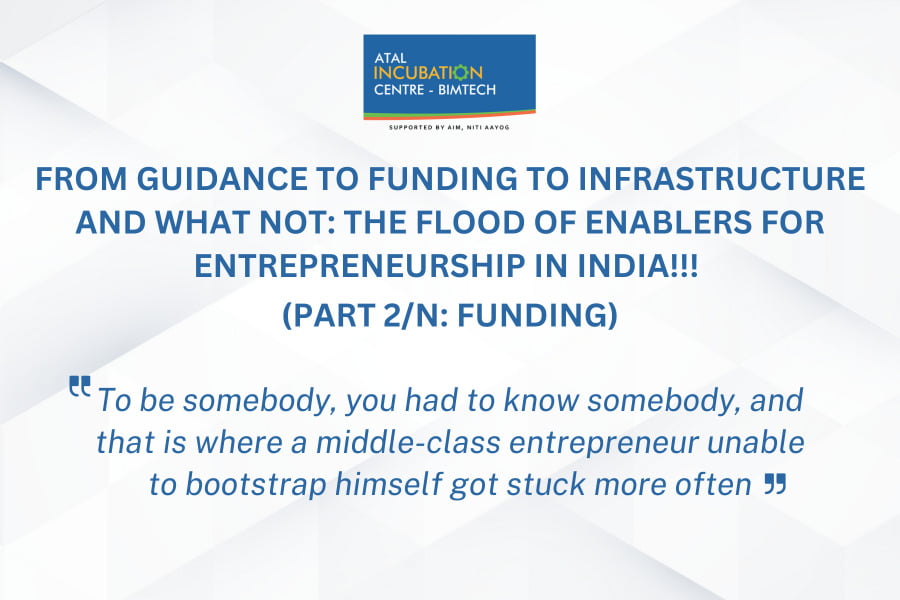
♦ A bootstrapped startup would not have to be answerable to external entities but would have to be cognizant that the bootstrapped money would only last so long, and they would have to turn to investors if they are unable to make themselves profitable.
♦ While banks may agree to fund a start-up in exchange for debt and do not interfere in the day-to-day operations of the start-up, institutional investors, VCs, equity funds, and angel investors typically invest in a venture for equity or part of the ownership of the venture and do push the founders to achieve high growth targets.
♦ Support organizations like incubators or accelerators mentor and guide a start-up to make it ready for investment and also connect them with the appropriate funding agency be it the different kinds of investors or some government scheme that they qualify for.
Blog Part 1/n: Click to Read!
Hello readers, here’s the second article in the series I started writing a few weeks back on the enablers of entrepreneurship in India. Although there is no doubt that the growth of the entrepreneurial ecosystem is being pushed by a variety of government policies available for start-ups not only at the central as well as state levels but also catering to the different types and stages of start-ups, it is essential to understand that such exponential growth results won’t be possible without the intervention of other enabling actors in the ecosystem like academic institutions, mentors, investors, corporations, etc. In this article, I am going to focus on one such enabling actor, i.e., investors.
When we think about business, we think of money. Money that we’ll be able to make and the money we need to be able to start. And that’s probably why, before any other support system, the first one to be able to establish itself firmly in the market was the investor network. Investor network was typically made up of people with money who were looking to make more money by giving it to someone with a commercial business and willing to give their all to make it work. But one huge factor which made it difficult for an ordinary person to get even 5 minutes of their time was ‘connections’!

To be somebody, you had to know somebody, and that is where a middle-class entrepreneur unable to bootstrap himself got stuck more often than not…
Let’s talk about bootstrapping first; a start-up or entrepreneur’s bootstrapping itself typically means that they are using their savings or that of their friends, family, and other personal contacts to finance their venture without raising debt from the market. This is probably the safest option for a start-up, allowing it to grow naturally and without intervention. A bootstrapped startup would not have to adhere to the timelines or growth numbers given by external investors. Still, at the same time, it would have to be cognizant of the fact that the bootstrapped money would only last so long, and they would have to turn to investors if they are unable to make themselves profitable.

External investors may be of many kinds: banks, institutional investors, venture capitalists, private equity funds, angel investors, government funds, and grants. While banks may agree to fund a start-up in exchange for debt and do not interfere in the day-to-day operations of the start-up, institutional investors, VCs, equity funds, and angel investors typically invest in a venture for equity or part of the ownership of the venture and do push the founders to achieve high growth targets. How may I reach them you ask, well, one easy and emerging way of reaching investors is through the different networking or pitching events that are increasingly being organized in the country. Some examples are UPGIS 2023, G20 Roadshow events, networking events by incubators, investment groups, and various government agencies. You just have to keep your eyes and ears open when such an event is announced, apply for access, go through the screening process and voila! You’ll be able to pitch and showcase your product to multiple investors at once.Government funds or grants are one kind of fund-raising option that has emerged for start-ups which neither puts the pressure of debt on the start-up nor asks for ownership but chooses to finance a venture based solely on the merit of the idea and the potential it shows.
The government has found and enabled a variety of ways for a start-up or even a person with a credible idea to get funding to commercialize that idea through grants in India by participating in competitions directly undertaken by funding ministries like BIRAC, MoMSME, etc., or through associating with support organizations like incubators or accelerators which mentor and guide a start-up to make it ready for investment and also connect them with the appropriate funding agency be it the different kinds of investors or some government scheme that they qualify for. Such organizations have made access to investors possible and easy if you and your idea are worthy irrespective of where you come from.
And while we are at money matters, it may be of interest for you to know that the government has been continuously enabling the survival of start-ups and small businesses by various measures, be it exempting them from tax on capital gains or giving them tax holidays or setting up a Fund of funds with a corpus of several thousand crores to boost entrepreneurship.
With funding made easy and various initiatives to resolve financial issues, let’s see if we can also see a rise in the number of start-ups surviving for five years.

